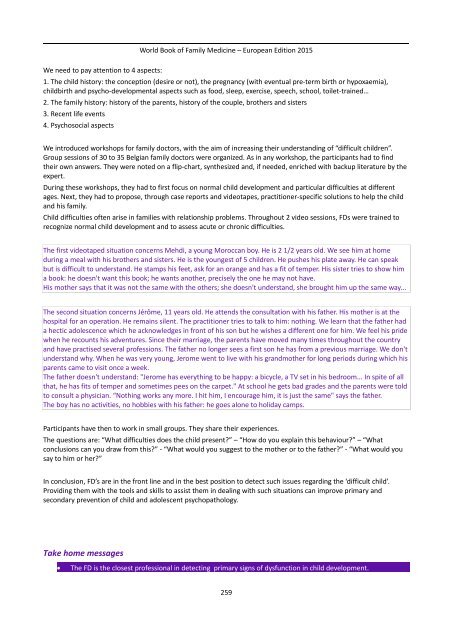Family Medicine
World Book 2015
World Book 2015
You also want an ePaper? Increase the reach of your titles
YUMPU automatically turns print PDFs into web optimized ePapers that Google loves.
World Book of <strong>Family</strong> <strong>Medicine</strong> – European Edition 2015<br />
We need to pay attention to 4 aspects:<br />
1. The child history: the conception (desire or not), the pregnancy (with eventual pre-term birth or hypoxaemia),<br />
childbirth and psycho-developmental aspects such as food, sleep, exercise, speech, school, toilet-trained…<br />
2. The family history: history of the parents, history of the couple, brothers and sisters<br />
3. Recent life events<br />
4. Psychosocial aspects<br />
We introduced workshops for family doctors, with the aim of increasing their understanding of “difficult children”.<br />
Group sessions of 30 to 35 Belgian family doctors were organized. As in any workshop, the participants had to find<br />
their own answers. They were noted on a flip-chart, synthesized and, if needed, enriched with backup literature by the<br />
expert.<br />
During these workshops, they had to first focus on normal child development and particular difficulties at different<br />
ages. Next, they had to propose, through case reports and videotapes, practitioner-specific solutions to help the child<br />
and his family.<br />
Child difficulties often arise in families with relationship problems. Throughout 2 video sessions, FDs were trained to<br />
recognize normal child development and to assess acute or chronic difficulties.<br />
The first videotaped situation concerns Mehdi, a young Moroccan boy. He is 2 1/2 years old. We see him at home<br />
during a meal with his brothers and sisters. He is the youngest of 5 children. He pushes his plate away. He can speak<br />
but is difficult to understand. He stamps his feet, ask for an orange and has a fit of temper. His sister tries to show him<br />
a book: he doesn't want this book; he wants another, precisely the one he may not have.<br />
His mother says that it was not the same with the others; she doesn't understand, she brought him up the same way...<br />
The second situation concerns Jérôme, 11 years old. He attends the consultation with his father. His mother is at the<br />
hospital for an operation. He remains silent. The practitioner tries to talk to him: nothing. We learn that the father had<br />
a hectic adolescence which he acknowledges in front of his son but he wishes a different one for him. We feel his pride<br />
when he recounts his adventures. Since their marriage, the parents have moved many times throughout the country<br />
and have practised several professions. The father no longer sees a first son he has from a previous marriage. We don't<br />
understand why. When he was very young, Jerome went to live with his grandmother for long periods during which his<br />
parents came to visit once a week.<br />
The father doesn't understand: "Jerome has everything to be happy: a bicycle, a TV set in his bedroom... In spite of all<br />
that, he has fits of temper and sometimes pees on the carpet." At school he gets bad grades and the parents were told<br />
to consult a physician. “Nothing works any more. I hit him, I encourage him, it is just the same" says the father.<br />
The boy has no activities, no hobbies with his father: he goes alone to holiday camps.<br />
Participants have then to work in small groups. They share their experiences.<br />
The questions are: “What difficulties does the child present?” – “How do you explain this behaviour?” – “What<br />
conclusions can you draw from this?” - “What would you suggest to the mother or to the father?” - “What would you<br />
say to him or her?”<br />
In conclusion, FD’s are in the front line and in the best position to detect such issues regarding the ‘difficult child’.<br />
Providing them with the tools and skills to assist them in dealing with such situations can improve primary and<br />
secondary prevention of child and adolescent psychopathology.<br />
Take home messages<br />
<br />
The FD is the closest professional in detecting primary signs of dysfunction in child development.<br />
259


